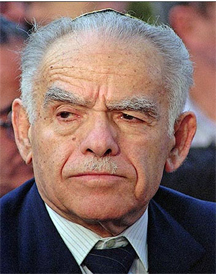JERUSALEM (Reuters) – Yitzhak Shamir, the hawkish Israeli leader who two decades ago first balked at US calls to trade occupied land for Middle East peace, died on Saturday after a long illness. He was 96.

The second longest-serving prime minister after Israel’s founder David Ben-Gurion, Shamir clung to the status quo. Admirers saw strength and resolve in his position, while critics called him an intransigent naysayer who allowed Arabs to cast Israel as obstructing reconciliation.
“Yitzhak Shamir belonged to the generation of giants that founded the State of Israel and fought for the freedom of the Jewish people in its own land,” Prime Minister Benjamin Netanyahu said in a statement after his death.
Shamir professed a commitment to peace, calling it “the only prize … that can justify any war,” but insisted Israel never be rushed into a deal or lose its nerve.
“Big countries, I told myself, can afford to make mistakes; small ones cannot,” he wrote in his memoir “Summing Up”.
Born in Poland with the surname Yezernitzky, Shamir moved to British-ruled Palestine before the Holocaust, in which his family died. Steely and secretive, he ran missions against British and Arab targets for the hardline Jewish underground group Irgun, taking his Hebrew name from an alias used to evade police dragnets.
Captured and deported to Eritrea in 1946, the diminutive, beetle-browed Shamir missed much of the fighting that led to Israel’s founding two years later. Upon his return, he found himself out of step with the country’s left-leaning political leadership of the day.
The Mossad spy service provided Shamir a back door to power. Recruited in 1955, Shamir clambered up the Mossad’s ranks during shadow wars with regional foes and international hunts for Nazi fugitives.
He credited a posting in France with lending some refinement to his style – “the scenery, the way people looked, the food, the wine, Piaf,” he reminisced – and prepared him for his 1980 breakthrough as foreign minister for the rightist Likud party.
Shamir was a mistrustful diplomat. Prime Minister Menachem Begin had signed a landmark peace accord with Egypt in 1979, yet Shamir bristled at Cairo’s insistence that Israel make way for Palestinian independence.|
“Judea and Samaria are an integral part of the land of Israel, neither ‘captured’ … nor ‘returnable’ to anyone,” he said, using biblical terms for the occupied West Bank, which, along with the Gaza Strip, the Israelis had extensively settled, and where the Palestinians seek statehood.
